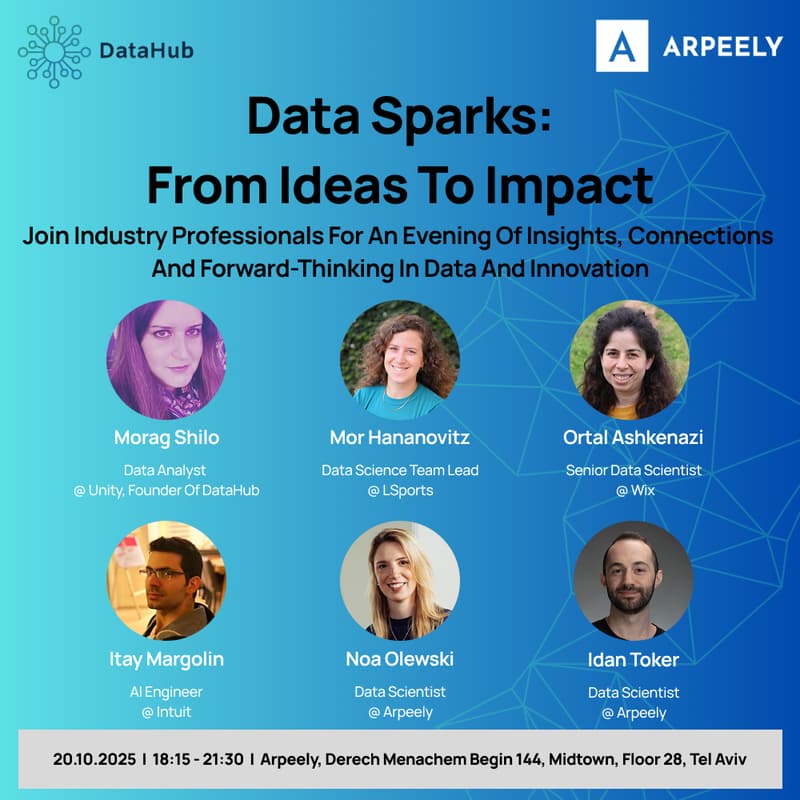

Data Sparks: From Ideas To Impact
Agenda:
18:15-19:00 Gathering & networking
19:00-19:10:
Morag Shilo - Data Analyst @ Unity and DataHub Founder
The story behind establishing DataHub
19:10-19:30:
Idan Toker - Data Scientist@ Arpeely
Noa Olewski - Data Scientist@ Arpeely
How Data at Arpeely Sparked Impact in Marketing—and in My Career
At Arpeely, we specialize in programmatic advertising solutions that blend machine learning with a deep understanding of market dynamics. But the real spark comes from the people behind the data.
In this talk, we’ll share two sides of the journey: first, a look at how Arpeely drives impact in performance marketing, and then a personal story of growing from data analyst to data scientist. Together, it’s about how ideas fueled by data can turn into real impact—for a company and for a career.
19:30-20:00:
Itay Margolin - AI Engineer @ Intuit
Patent Your Ideas Faster with Systematic Inventive Thinking (SIT)!
Want to turn your ideas into strong patents? Systematic Inventive Thinking (SIT) helps you create new inventions that can be patented.
SIT is different from regular brainstorming. It teaches you to find new solutions using only what you already have. This helps you:
* Create Patentable Inventions: Use SIT tools like "Task Unification" (making one thing do more), "Subtraction" (taking things away), and "Division" (breaking things apart) to build unique ideas. These ideas are strong for patents.
* Show What's New: SIT helps you prove your invention is new and not obvious. This is key for getting a patent.
* Get Stronger Patents: SIT helps you make your patent claims wider, giving you better protection for your invention.
Stop guessing! Use SIT to create, define, and protect your new inventions. Learn to write patents by designing ideas that are easy to patent from the start. Start inventing, start protecting!.
20:00-20:30:
Ortal Ashkenazi - Senior Data Scientist @ Wix
Mor Hananovitz - Data Science and Engineering Team Lead @ LSports
Learning How to Learn in the AI Era (Using Agents as a Use Case)
Today, the key skill isn’t mastering every line of code - it’s keeping up. This talk shows how understanding core concepts, using AI tools, and writing effective prompts can accelerate learning and development in a fast-moving AI landscape.
In today's fast-evolving AI landscape, one of the biggest challenges isn't just learning what to build—but how to learn to build. In this talk, we'll share our journey of learning how to learn in the world of AI, focusing on understanding the right concepts before jumping into implementation.
We’ll explore how focusing on learning theory and concepts, combining using AI tools and a few good prompts - can help developers navigate the growing AI ecosystem more effectively.
Using Agents as our main use case, we'll walk through how we took an early prototype written in a simple notebook and scaled it into a production-grade code, based on LangChain’s LangGraph framework, wrapping it all up with a ready-made UI using Streamlit – all done fast and simple using Cursor.
Whether you're just starting your AI journey or trying to bring structure to your experimental projects, this talk will give you a clear view of the critical skills and concepts that can help you scale your ideas—with agents as a practical and exciting example.
20:30 - 21:30 - more networking